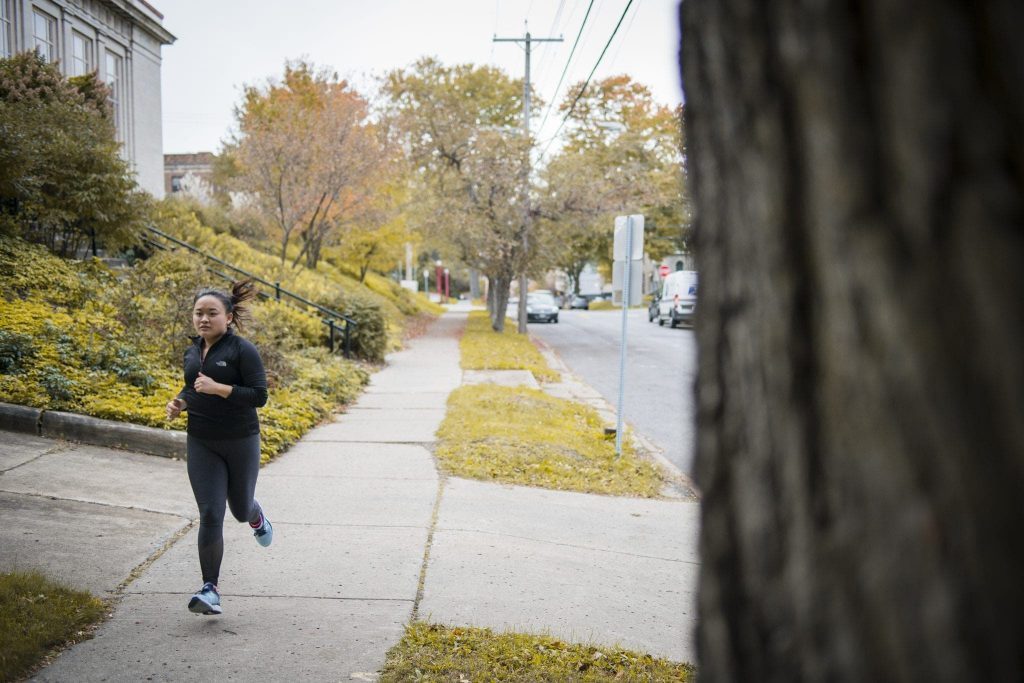Syracuse women wary about running alone
Syracuse women wary about running alone

Mickey Piscitelli went running alone in Onondaga Lake Park several years ago on a quiet and rainy afternoon. Partway through her run, Piscitelli noticed two men who did not fit in with the usual park-goers. They wore work boots and didn’t appear to be exercising or socializing. Instead, they stood near the trail she was on, watching her as she ran.
“When I ran past them, the hair on the back of my neck stood up,” Piscitelli said. “I really felt a little shiver go down my spine.”
Piscitelli stopped her run and went to the park’s main office to tell employees about the suspicious men. Afterward, she decided not to complete her run and returned home.
Nothing bad happened to Piscitelli that day, but the caution and distrust of strangers that she possesses while running is representative of those shared by the female running community. According to a 2017 survey by Runner’s World, 43 percent of women face harassment while running, and the rate increases to nearly 60 percent for women under the age of 30. More than half of the women surveyed reported concern over being physically assaulted while running.
In August, Mollie Tibbetts, the 20-year-old University of Iowa student who disappeared in July while running near her Iowa home, was found murdered. Even here in Syracuse, Tibbetts’ death is a painful reminder for many female runners of the dangers they face every time they leave their doors to run.
According to Holly Kearl, Stop Street Harassment founder, an organization with the goal of ending violence in public spaces, 81 percent of women surveyed in their January 2018 study reported they had experienced some form of sexual harassment or assault in their lives. The top forms reported were verbal harassment and unwelcome sexual touching, at 77 and 51 percent respectively.
“I don’t want to live in fear,” Piscitelli said regarding Tibbetts’ death. “I will continue to run, and I’ll be as logical and smart as I can.”
The issue of female safety while running isn’t new. Piscitelli, a seasoned runner and a triathlon coach at the YMCA of greater Syracuse, attended a Road Runners Club of America conference around 25 years ago, where the first program she went to was on safety and self-defense. As a coach, she tells her runners – especially women – to avoid running alone, wearing headphones and creating regular routes.
Mallory Mitchell, a coach at the Dewitt running store Fleet Feet Sports, said Tibbetts’ death has motivated local female runners to take increased safety measures. In the past several weeks, Mitchell has observed a rise in the number of women coming in to buy personal alarms, small handheld devices that a runner can deploy to emit a shrill noise if they feel unsafe.
“It’s always sickening,” Mitchell said of Tibbetts’ death, adding that she believes it to be representative of the sexual harassment and violence issues that women generally face.
Jen Wood, the half-marathon coach for the Syracuse YMCA, said she’s experienced her share of harassment throughout almost 20 years of running, from having coins thrown at her by a passing car to yelling and catcalls, always from men.
Wood added that she has friends that have gone to extremes to stay safe since the news of Tibbetts’ death, including carrying pepper spray or wearing special rings that can be used to scrape against an attacker. One of the runners that Wood coaches decided in the aftermath of Tibbetts’ death that she will no longer run outside if she can’t find someone to run with.
“It breaks my heart when I hear that people have been deterred by it,” Wood said. Wood hopes that Tibbetts’ death will empower other women to keep running. She intends to host a safety class as one of her next programs due to increased interest in self-defense from the women in the groups that she coaches.
Grace Fox, a sophomore at Syracuse University and running club member, was taught safety by coaches in high school when she first started running. During trail runs, she said her coach would make everyone carry mace in their hands as protection. For Fox, safety and running have always co-existed. Tibbetts’ death was just another reminder of the potential danger she faces each time she puts her sneakers on to go running alone.
“It’s always scary to think about it,” Fox said. “This could happen to me. I shouldn’t have to be worried, but I am.”





